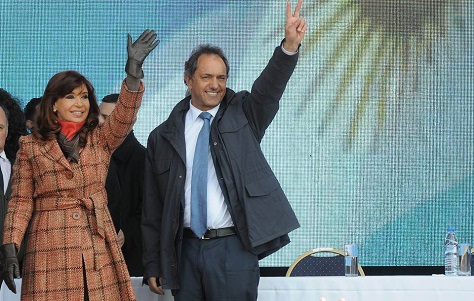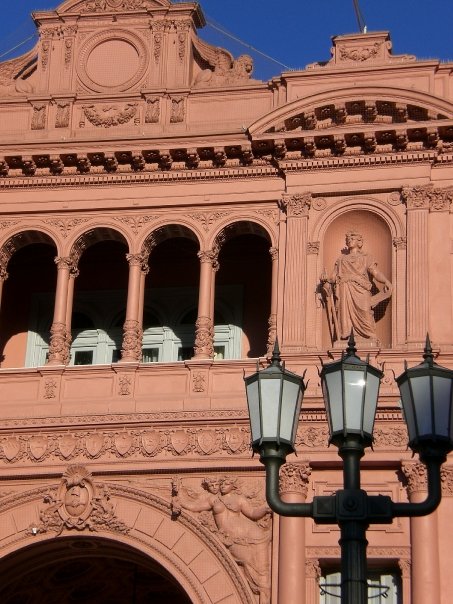On August 9, Argentine voters will take part in a compulsory open primary — the dress rehearsal for the general election set for late October.![]()
It’s the first presidential election since 1999 where a Kirchner won’t actually be on the ballot. Nevertheless, kirchnerismo is very much on the ballot, and its standard bearer, Daniel Scioli, the candidate of the ruling Frente para la Victoria (FpV, the Front for Victory), served as the late president Néstor Kirchner’s vice president between 2003 and 2007.
The country’s pre-game primary, however, is a relatively new feature to Argentine democracy. The outgoing incumbent, Cristina Fernández de Kirchner, introduced open primaries in time for the 2011 elections — mandatory for both parties and voters alike. Candidates must win at least 1.5% support in the primary to advance to the general election. In a country where polling is still more art than science, and where political parties and coalitions are still more personality-oriented than long-term ideological vehicles, the primary is the most reliable test of electoral support before the October 25 election.
* * * * *
RELATED: Everything you need to know
about Argentina’s impending default
* * * * *
If polls remain as tight as they are today, and no candidate wins (i) either 45% of the vote outright or (ii) at least 40% of the vote (and leads the nearest candidate by more than 10%), the country will choose between the top two finishers in a November 22 runoff.
So this Sunday’s primary could be the first of three showdowns for the Casa Rosada.
In the most perfunctory sense, there should not be much suspense about the results — the three frontrunners in the presidential race are widely expected to win their coalitions’ respective nomination against token opposition. The more interesting race, perhaps, is the battle to replace Scioli as the next governor of Buenos Aires province. But because it’s an open primary, each of the three major candidates are also competing against each other to demonstrate that they can reach the 40%/45% hurdle in October.
So who are the chief contenders for the Argentine presidency and what would their leadership mean for the country and for South America?
Argentina, a nation of nearly 41.5 million people, about half of whom live in the relatively affluent Buenos Aires metropolitan area, is Latin America’s third-largest economy — after Brazil and Mexico. Voters will also elect half of the 257-member Cámara de Diputados (Chamber of Deputies), the lower house of the Argentine National Congress and two-thirds of the Senado (Senate), the upper house.
The winner of the October election will face an economy still struggling with capital controls, a decade of encroaching nationalization and, still shut out of global bond markets, a bad-boy reputation for the lingering effects of its debt default. Though the economy has slightly improved since its nadir in 2013 and 2014, Fernández de Kirchner and her charismatic, Marxist economy minister Axel Kicillof (himself a candidate for the Argentine Congress in 2015) are still coping with high inflation, a relatively low level of foreign reserves, a divergent black-market rate for the Argentine peso and pressure from Brazil’s political and economic troubles and a devaluing real.
Mauricio Macri
chief of government of city of Buenos Aires

Macri, who is finishing his second term as the head of government of the city of Buenos Aires (essentially the mayor), an autonomous district distinct from the country’s 23 provinces, is the chief center-right candidate in the race.
Macri’s party, the Propuesta Republicana (PRO, Republican Proposal), has little influence outside Buenos Aires, and so he’s joined forces with another small centrist party, the Coalición Cívica (Civic Coalition), founded in 2007 by Elisa Carrió, an attorney, former beauty queen and a national deputy first elected in 1995, and with the more long-standing Unión Cívica Radical (UCR, Radical Civic Union). The UCR’s origins date back to the 1890s, but throughout the 20th century’s periods of civilian rule, it has traditionally been the chief alternative to peronismo since the 1930s and 1940s. The UCR last won the presidency in the 1999 election under the leadership of another former Buenos Aires mayor, Fernando de la Rúa, who ultimately resigned after the December 2001 crisis-related riots. Together, the three parties have formed an electoral coalition christened Cambiemos (‘Let’s change’). Carrió and Mendoza senator Ernesto Sanz will challenge Macri for the coalition’s nomination, though Macri is the overwhelming favorite. After the primaries, Macri will need the UCR’s wholehearted support, particularly in the western province of Mendoza, where Alfredo Víctor Cornejo won a gubernatorial election in June against the kirchnerista candidate.
In a country where nearly every politician tries to embrace the legacy of Juan and Eva Perón, and where the electorate still blames liberal economic policies for the country’s wrenching 1999-2001 recession, Macri has increasingly moderated his policy stands. Commentators joke that Cambiemos describes Macri’s uncomfortable jog to the center-left peronista comfort zone of Argentine politics. For example, he’s reassured voters that he will not privatize Aerolíneas Argentinas or YPF, the state oil company, both of which were nationalized over the past decade to help boost the state’s coffers. He has also struck a nationalist tone over potential negotiations with US-based hedge funds that seek Argentina’s full payment of bond obligations.
His longtime chief of cabinet Horacio Rodríguez Larreta, narrowly won a runoff last month to succeed Macri as Buenos Aires mayor, defeating a more centrist opponent — though it wasn’t as convincing a win as Macri would have liked, the FpV’s candidate didn’t even make it to the runoff.
Bottom line: Macri doesn’t have an easy path to the presidency, given long-standing Argentine suspicions about neoliberal policies that long preceded the 1999-2001 financial crash. Nevertheless, he is a popular official in Buenos Aires, and he has a solid narrative about his governance of the city (especially in light of living standards in the wider Buenos Aires province that Scioli governs). If Macri wins, it could unleash a wave of pent-up demand for investments in Argentine assets. Expectations will run high that Macri can bring Argentina back into global equity and debt markets and reverse the kirchnerista course — up to a point, at least.
Sergio Massa
former chief of cabinet of ministers and mayor of Tigre

Shortly after the October 2013 midterm congressional elections, Massa emerged as the frontrunner for the 2015 presidential race.
Young and charismatic, he led a group of leftist peronista dissidents, triangulating himself and his newly formed Frente Renovador (FR, Renewal Front) between the neoliberal right and the fully kirchnerista left, to an out-of-the-blue victory throughout Buenos Aires province.
Massa has indicated that he would introduce reforms to satisfy businessmen and investors, including a gradual end to currency controls. But Massa positioned himself as a correction to (and not a repudiation of) the policies of Kirchner, his one-time boss. As chief of cabinet in 2008 and 2009, Massa led the effort to raise agricultural taxes, a move that backfired when farmers marched on the capital in protest. Massa left the Kirchner administration and Kirchner herself backed down from the policy.
José Manuel de la Sota, the governor of Córdoba province since 2011 (and previously, between 1999 and 2007), will face off against Massa to lead a coalition that also includes Argentina’s small Christian Democratic Party. Though Massa is very likely to advance to the October election, polls show that he is now falling behind both Scioli and Macri. If his primary vote totals are unimpressive, he’ll face pressure to drop out of the race and back Macri, forming a united opposition front against kirchnerismo.
In a race against the two-term mayor of Buenos Aires (with over 3 million residents) and against the two-term governor of Buenos Aires province (with over 16 million residents), Massa’s record as mayor of Tigre (with just 31,000 residents) means that he lacks the patronage networks of his rivals.
Bottom line: Massa has been increasingly crowded out by Kirchner’s (and Scioli’s) surging popularity and the sense that the opposition is uniting around Macri. There’s a growing sense that he is the 2015 version of Brazil’s Marina Silva — in trying to be all things to all people, Massa’s support could collapse from both the right and the left. But Massa is nevertheless well-placed as a kind of ‘Goldilocks’ option for the Argentine electorate. He’s reformist enough to realize fiscal policy needs to change but peronista enough to realize that post-Kirchner politics won’t be easy. A credible third-place finish — or a last-minute alliance with Macri — could establish him as a contender in the 2019 election.
Daniel Scioli
former vice president and governor of Buenos Aires province

Scioli, increasingly, is the candidate of continuity.
As the unopposed candidate vying for the FpV’s presidential nomination, he is the only major president candidate who won’t face at least token opposition. That’s one of the reasons that Scioli will likely emerge with the greatest number of votes in the primary.
But he’ll also benefit from the sense that Fernández de Kirchner’s popularity is on the rise and that the economy is slowly improving, though both effects may come from election-year spending.
Nevertheless, even many of his supporters cringed when he selected Kirchner loyalist Carlos Zannini, another Marxist enthusiast, as his running mate. That cleared the path for the FpV’s full-throated support and Fernández de Kirchner’s welcome endorsement. But it also engendered new doubts about Scioli’s ability to govern in his own right — instead of a puppet and a placeholder until Fernández de Kirchner would be eligible to return for the presidency in 2019.
Bottom line: Timing seems to be on Scioli’s side, and if the economy continues to improve by the end of October, many Argentines will be tempted to give kirchnerismo another term in power. Nevertheless, Scioli must know that he will have to roll back capital controls and at least some of the most egregious nationalizations if he wants to attract any foreign investment or re-enter the bond market. The most important question is whether Scioli has enough independence to chart his own course in a post-Kirchner era.
